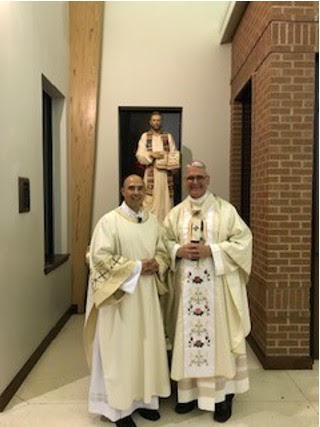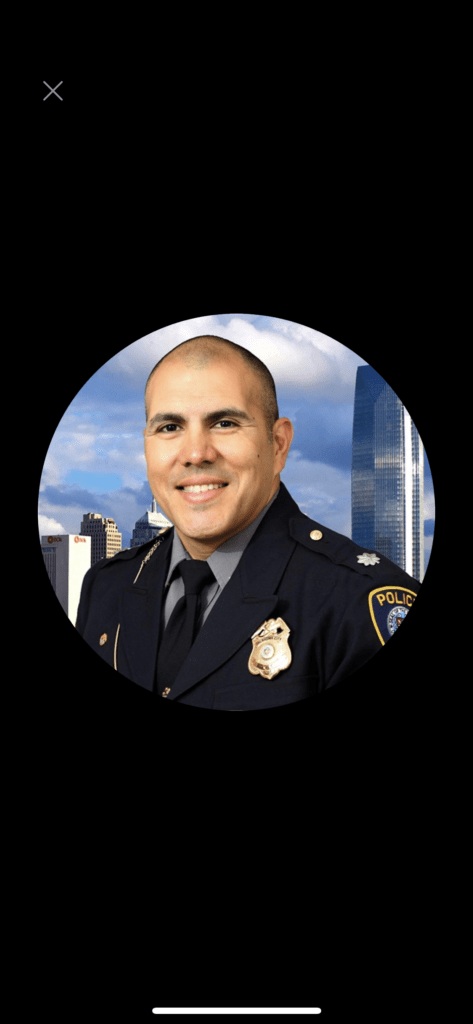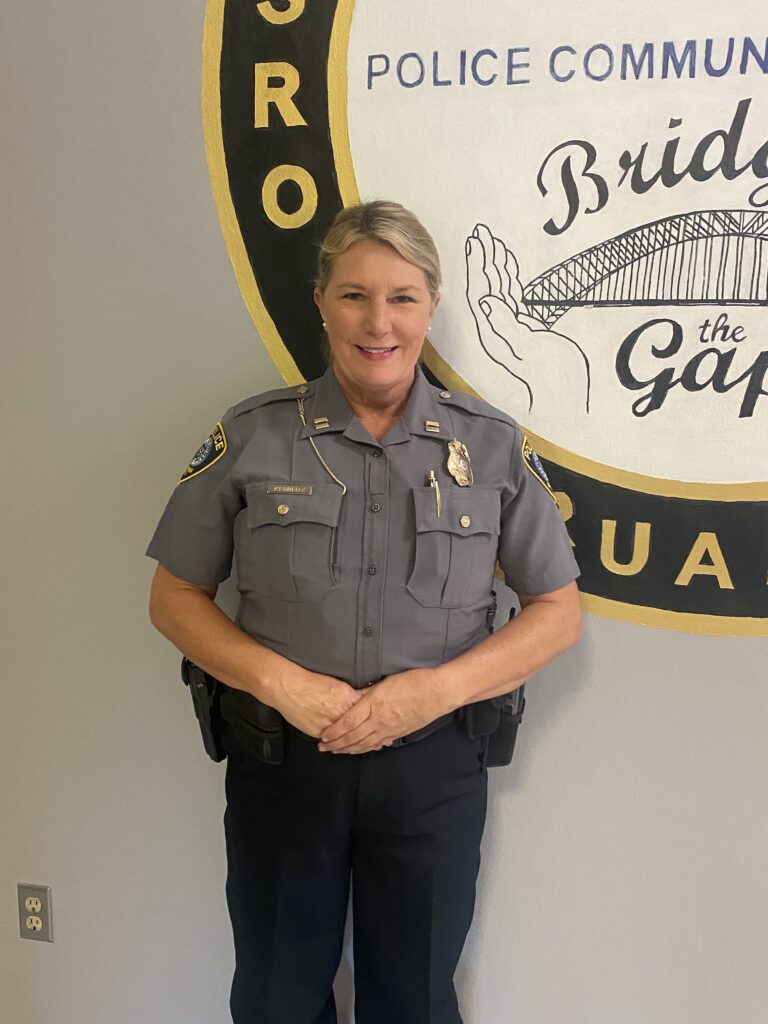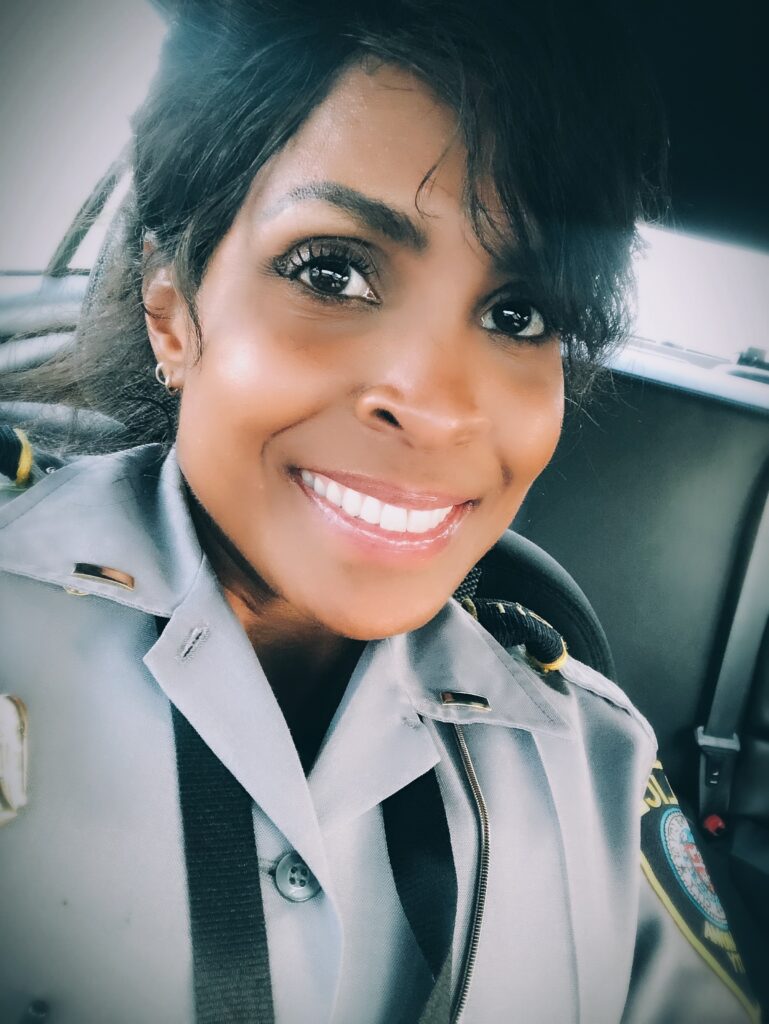Oklahoma City was a superstar in National Faith & Blue Weekend programming. From a town hall to a Habitat for Humanity Build to a Barbeque. The conversation was held before the event with the faith and blue leaders who put the activities together.

Jared Feuer, National Faith & Blue: Let’s start with – what was interesting to you about participating in National Faith & Blue Weekend?
Father Pruett: Well, I’ll start: One of the things that I’ve been concerned about is that there has been a lot of bad press about what’s happened. The media covers it, it’s not always fair, but that’s what they do. And it creates a lot of anxiety on the part of the community toward law enforcement. And as you know, there’s been a movement to defund police departments. And then reality must have set in for most people to realize that we need our police departments for a lot of reasons. But there is a lot of anxiety, and my community is not so different – it’s left with a lot of anxiety for what this might mean and what’s really going on. And so when you offered to come and talk about what you’re doing, I thought it was an answer to my prayers. I was excited about it when I first heard about it. And I still am.
Deputy Chief Balderrama: As far as the police department is concerned, for us it’s a no-brainer. I mean, here in the state of Oklahoma, in Oklahoma City, churches play a big role in the fabric of our community. We probably have more churches per a quarter mile than just about any place in the country. We know that church and faith is important to a majority of citizens who live here. And to be part of an event like this which is inter-denominational, throughout the entire city, and not just one part of town. And it made a whole lot of sense to us. And any time we can engage with the community, with the faith community, with citizens. Answer questions. And really have a broader conversation about the issues which are going on. Some of the things that Father Pruett talked about, nationally, those concern us as well. Some of the videos that we’ve seen, those are heartbreaking and difficult to watch for police as well. And I’d argue that more so, because some of these individuals involved are wearing a similar uniform to what we’re wearing. Definitely the conversations need to be had. Another thing that is very negative when something like this happens is that it moves like the entire country in a vacuum. You have a single incident that occurs a thousand miles away but yet it’s viewed a million times, by a lot different people who might not have information about the background. They see it so much that they make the assumption that this is happening every other day. And it’s not. Like the one that happened in Minneapolis are extremely rare. They don’t happen very often at all. But when they do happen, it’s important for us to have these types of conversations. Explain to the public what we’re doing. And some of the positive things get lost in all of this. There are great outreaches that we have like the Police Athletic League. You see the mural in the background behind Captain Kennedy and Lieutenant Hardin. And Lieutenant Hernandez is a brand new lieutenant over PAL, and he’s doing a lot of good things everyday. And they affect hundreds of kids, but yet, one negative incident puts a blemish on all of us. So these events are incredibly important. They are not difficult for us to be a part of. Especially Faith and Blue. Faith and Blue is a package deal, just add water and it’s ready to go. So for us it was very easy to say yes.

Pruett: Well in years gone by, you had police officers walking the beat on foot. Which meant they watched a lot of people in the community, and knew them by name. Today that’s not how we do it anymore. Maybe we should but we don’t. As a result most people don’t know any police officers. In my parish, there are four or five people who are police officers, so some of us know them. But I don’t know how many members of the community overall do know Fernando, or others who are there as well.
Balderrama: That’s a great point. In traditional police work, community policing, from back in London in the 1800’s – that’s the best way of doing it. When a single police officer works a single block. And everybody knew them, knew him or her. And that’s basically what community policing is. Now like a city that is Oklahoma City, we have a huge disadvantage. Disadvantage being square miles. We are the third largest city by square mile in the country. So the opposite of community policing is a police car, which unfortunately due to our manpower, we are going from one high priority call to the next high priority call. And unfortunately there is not a lot of time for that engagement. Now officers get pretty creative. They go to a call. Maybe if it’s an apartment complex and they see some kids playing basketball, they will make the effort to walk over and engage with the kids. Play basketball, throw the football around. And those moments are beautiful, that’s a great opportunity for one on one, but when we can’t do that, we have to be more deliberate, like we are being with Faith and Blue, like the PAL program. The whole nature of PAL is community policing and mentoring kids 1:1 and you know sometimes we do it out of uniform, so they can see us as someone who is not an authority figure. Someone who cares about their well-being and can engage with them. And those are great moments, and we believe in those, because the two most important priorities for a police department right now are community safety and community trust. There’s no secret. No complicated feeling. It’s safety and trust. The nature of our policing. The number one priority is to have a safe community. Why have police if we can’t walk down the street and be assaulted or beat up. But we can’t do our job without community trust. So these programs, like faith and blue, they are the opportunities that once you get to sit down with Lieutenant Hernandez, Captain Kennedy, Lieutenant Hardin. But once you sit down and get to know them and know them personally then you have a relationship with those individuals and you know who they are . When you know someone you trust someone .But if we never take the time to engage we’re never going to have that trust. We feel extremely grateful that this is coming up. The Chief is going to play a part in it. The other Deputy Chiefs are going to be a part of it. And we do hope that it’s an annual thing, we hope that we’re doing the tenth annual Faith and Blue in ten years.
Pruett: That sounds great to me. In my parish we have many immigrants and there’s a lot of anxiety about police officers and ICE officers and that sort of thing. And I think we can communicate to them that it’s not the job of the Oklahoma City Police department. That’s not what they do. And for the more part the Police Chief discourages that type of involvement. But for most people they don’t know that. They know what the police were like where they came from and that was often not good, so we need to change that mold.
Feuer: So Captain Kennedy, you’ve been involved in planning the activity. We had sample opportunities in the toolkit. What led to the activities that you selected? What were the reasons for the one you picked?

Captain Kennedy: Well my team had a group meeting and we went over them together. At first when I got this project assigned to me, I thought it was a little overwhelming. I am not an event organizer, and I’ve never organized something of this magnitude, but then I realized you guys already had a lot of things in place. Still, I was panicking and was worried about getting it done in a month. The team and I went through all the suggested activities and also took some pointers from our Deputy Chief’s. They mentioned they really wanted a community service project, so we chose the build with Habitat for Humanity, which was framing a house. That’s our kick off event! Lt. Hernandez mentioned his church wanted a question and answer session with the police department. So that event sort of created itself. Our Chief of Police’s church had the idea of a barbeque and sitting down with members of the congregation and getting to know them and having good conversations. The last event is a town hall virtually and that one was already in the works before Faith and Blue came about. A group of pastors had been asking our Chief of Police to do this, so it all came together easy. We also were trying to reach out to different faiths. We reached out to a mosque, and we were hoping to do an event with one of them. But that didn’t work out. They had a COVID outbreak so they shut down their services. But hopefully we can keep our relationship with them and maybe do something in the future. We reached out to a Vietnamese church but it was the same thing, they were concerned about COVID. But we ended up having non-denominational churches, a Catholic Church, a Baptist church and a Presbyterian Church.
Feuer: Lieutenant Hardin, is there anything that you wanted to add to that?
Lieutenant Hardin: We also reached out to surrounding police departments and there are fourteen and we are having representatives from each of them at our kick off, we are excited about all of them joining us.

Feuer: So the next question is for Lieutenant Hernandez. You stand in both worlds, you are an officer and a member of the cloth. You are Faith and Blue. So how does it feel for you to be seeing both worlds at this time at which we’re in as society?
Hernandez: For me it’s easy to be in both occupations so to speak, that I do. It’s about being a servant. It’s about trying to help the community. What do I need to do to help my community as a police officer and as clergy. If you just want the best for others. It’s a no-brainer, it’s really easy to do.
Feuer: So the next question is what do you hope will result from Oklahoma City’s participation in National Faith and Blue Weekend
Pruett: I would like to see our people be far more at ease when they see a police car. That they don’t presume that there’s something going on that involves them. More trust is what I’m saying. And another thing I’m saying is that I would like to disabuse some of the PR that you all have received. Some of that’s not been helpful at all. And we need order in our society. Every society needs order. But that doesn’t mean repressive. And I would like for us to think of police being on our side. They are not the enemy. And I believe that we can achieve that. That they are not the enemy. As Fernando said so well. We are all seeking what we call the common good. For us lay folks to see that the common good involves all of us. That would be an awfully good thing.
Balderrama: I’d just say this that he’s completely right that the community shouldn’t fear their police. They should have faith in their trust officers. They should feel they can call whether immigrant or not. That we’re going to treat them fairly. And having the trust that we have measures of accountability. That when there’s a police officer acting out of line that we have the mechanisms to take corrective action. There’s no perfect soul amongst us. People are going to make mistakes. But an honest mistake is quite different from a malicious or repressive act. And that shouldn’t be tolerated. It shouldn’t be tolerated by the public. And certainly it isn’t tolerated by the Oklahoma City Police department. So definitely the community knowing that. Knowing that we need their support when we do take a tough stance. That our Police Chief, that our command is not going to just be supported by the city’s leadership, but by community members for doing the right thing. That’s something that’s going to take all of us. That it’s everyone’s job to hold everyone accountable.
Pruett: You know once of the things that you were just talking about. Maybe on a national level. A national prayer breakfast could be held where you invite various police departments and whoever happens to be on the upper level. I know there’s a national organization that helps with police work. And that can be publicized as a national comment on cooperation.
Feuer: My last question is how do you all feel that the national discourse on policing is influencing policing in Oklahoma City? And are there ways that policing is functioning in Oklahoma City that could benefit the rest of the country to see?
Balderrama: Well you know different parts of the country are experiencing different things. There were very little protests or disorder or vandalism in some parts of the country and there some parts of the country that are experiencing it for 100 nights in a row which is unimaginable. We have various organizations that police leadership is part of. The IACP, the Major City Chiefs Association is another one. As a matter of fact, I’ll be representing our department in New Orleans at the conference. It’s all major city chiefs. And you literally have a roundtable and you hear what you are experiencing in your part of the country. These conferences are extremely valuable because we see what solutions other cities are coming up with. And it’s an exciting time because we get to learn. And maybe we can share some information. Like we can share what we’re working on with Faith and Blue and maybe next year their city should do an activity. The national rhetoric becomes very political unfortunately. I might be in the minority that police departments as a whole shouldn’t be political in nature. We are here to protect the public. We shouldn’t be categorized in one camp or the other. We are here to serve the public. And we have to avoid an us against them. It should never ever be like that. I take a strong stance on that. We are here to protect the public. We are here to follow the Constitution, and if there’s a bad law, it’s up to our politicians to change it. You know it’s not up to us to become political to try to change it ourselves. So when people understand that. When people understand they are trying to politicize the police that they are red or blue or whatever. We are here for the public.
Pruett: Well I think emphasizing what you just said is very important because there are groups out there that have their own agenda and they are not part of the police force. For example the Kenosha – the guy running with a rifle.
Balderrama: Law and order is a stable of a modern society. When you include the clergy. There are rules, there are laws. People shouldn’t have free reign to hurt anyone else. Disorder is not something that is goldy. We want people to be able to protest whatever issue they feel strongly about. You know somebody from the ACLU told me that your Constitutional rights stop when your Constitutional rights impose on somebody else’s Constitutional rights. You know you have the right to be free and safe in society. When what you’re doing is causing someone else unrest; well that becomes civil disorder But definitely getting the rhetoric out of it. The people are here to keep people safe. That’s the bottom line. If you watched the national debate – it gets scary. You hear the rhetoric on every side. You know I think we have a hard enough time; don’t wrap us into other talk.
Pruett: I think that the work you are doing in that regard is to downplay the darkness and highlight the goodness is going on. I think being passive at a time like this makes you a sitting duck.
Feuer: Any closing thoughts?
Hardin: I’d like to add that I am a Lieutenant — and that our department, what makes it one of the best in the country is that they will listen and our chief is going to listen and he’s going to respond. The same with Captain Kennedy. We listen to each other and we feed on one another. I love them both and after twenty seven years – that makes a huge difference. they listen.
Pruett: Amen sister. I agree with that.
Hardin: That’s what I am talking about Father Pruett.
Pruett: You have to listen.
Kennedy: I just wanted to say that the whole title Faith and Blue – I don’t know who came up with it, but I love it! There isn’t a police officer that I know that doesn’t have faith. Everyone I know – Start’s their day with praying and asking for guidance through the day. I just love that name. Because we’re the blue. But we’re also faith members. I want the communities to know that. They might just see us as an authority figure and not realize we have faith too.
Pruett: That makes a lot of sense to me. I think whatever uniform you’re going to wear – you become something beyond arson.
Feuer: I think that’s right and a lot of what we’re doing is to recognize common humanity. Lieutenant Hernandez, do you have any closing thought?
Hernandez; I definitely feel that this Faith and Blue that we’re going to do next week is going to advance the trust in our community for us. Deputy Chief Balderrama and I were two of the original members of the bilingual force. And over the years we’ve seen an increase in trust, we still have a way to go, but Father Pruett at St. James, we always have a fall fest. And he always hires officers to come by and be seen and also for security, but over the years we’ve seen an increase of the officers that I usually hire to help Father Pruett out and they always come to me and say I really love coming back to this church. Please hire me next time. This is a fun event. I’ve never had so many people come up to me and want to be introduced to their kids. And it’s usually those who don’t speak English, but probably it’s where they come from, they don’t have that trust in the police. But here it’s totally different. And I’m starting to see it more and more as the years come by. And I do believe this will advance our trust.
Pruett: Beautiful.
Feuer: Father Pruett any closing thoughts?
Pruett: I am looking forward to this event. I hope we have a good crowd of people. We’ve been advertising it at masses. And I’m looking forward to a good day and it will be a good time for both the police and our people.
Feuer: And Chief Balderrama, any closing thoughts from you?
Balderrama: You know I just want to thank everyone who has been involved. All my staff. It’s pretty easy to just show up but the staff are the ones who do the work and set up all the meetings, work out the details. I’m very proud of what they’ve done. I do think this is going to be a really good event. We’re looking forward to it. I can’t believe it’s just a week away.
